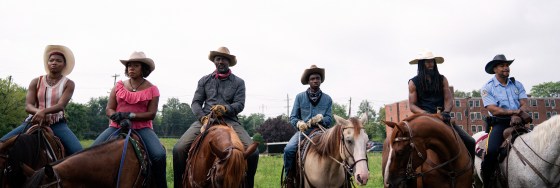Being a wonderful actor may be more of a blessing than being a great actor, and Idris Elba is a wonderful actor. In Concrete Cowboy, Elba plays a resident of North Philadelphia who’s a dedicated horseman, part of a community of riders and horse lovers who have long made use of a stretch of tumble-down stables that, in an increasingly gentrifying world, now lie right in the crosshairs of developers. Elba’s character, a laconic gent named Harp, shares his untidy house with a horse, cordoned off in a makeshift living-room stall.
Why is there a horse in Harp’s living space? Who cares? The presence of this horse, a creamy, speckled beast named Chuck, clues us in to certain qualities of Harp’s character that Elba unfurls for us later: this is a man of hard-nosed practicality who gives not a mane’s flick for the rules dictating how things should be done, particularly as they’ve been laid down by white people. He’s also a man who knows that beauty needs care and tending. No wonder Elba’s Harp, elegant even in a rumpled cotton shirt and tattered straw cowboy hat, feels at home with a regal equine houseguest.
Depending on how you define greatness, Elba may in fact be a great actor. But great actors—hamstrung by their obsessive attention to technique or their personal dignity, or both—are sometimes boring. And Elba is never boring.

Born in Britain but adept at pulling off regional American accents, Elba first caught the attention of TV audiences as the charismatic drug kingpin Russell “Stringer” Bell in The Wire. More recently, he’s starred as an emotionally tortured homicide detective on the British TV series Luther. In the movies, Elba has mostly learned to do a lot with a little, bringing unstudied glamour to roles like the reptilian villain Krall in Star Trek Beyond and the all-seeing Norse deity Heimdall in several Marvel movies. He even emerged with his dignity intact from the fascinating atrocity known as Cats. A man who can survive that unsettling CGI fur can be trusted with anything.
But the role of Harp in Concrete Cowboy is muscular enough to be worthy of Elba. Harp is the father of Cole (Caleb McLaughlin), a Detroit teenager who’s headed for trouble. His exasperated mother drops him off in Philly to spend the summer with his estranged father, an arrangement that pleases no one. Cole flirts with selling drugs, but as it turns out, he has a way with horses, most notably a surly creature known as Boo. Before Cole can ride, though, he must follow his father’s orders: that means slinging poop out of stalls.
Concrete Cowboy—directed by Ricky Staub and adapted from a novel by Greg Neri, inspired by Philadelphia’s real-life Fletcher Street Urban Riding Club—is your classic story about an irritable young man redeemed by an animal, and the embrace of a community. But it’s satisfying even so, largely because watching Elba is such a pleasure. The language Harp uses to describe his own youthful frustration could figure in any number of stories, but Elba opens it up anew. He tells Cole that as an absentee father stuck in jail, he begged Cole’s mother for the privilege of naming his son, choosing tenor saxophonist supreme and fellow Philadelphian John Coltrane as his inspiration: “He was the greatest man I ever knew who did it without a father.”
Read more reviews by Stephanie Zacharek
Elba turns the line itself into music: his voice, smoky and resonant, finds hidden notes we couldn’t have previously imagined, bent phrases wrought from scar tissue and resilience. And astride a horse, Elba radiates a citified elegance, like the stranger who rides into town and instantly captivates every local. His face, soulful and mischievous, reserves some of its secrets: Elba plays Harp as a man whose past we’re invited to imagine, one who finds solace in stroking the nose of a horse.
Elba is always magisterial, and for years now, his fans have been floating his name as a candidate for the next James Bond. Just imagining him in the role invites rapture: Elba was born for the luxe chill of a martini glass and the satin sheen of a tuxedo lapel. So let’s think, for a minute, about what this casting choice would mean. Calls for representation in casting, as well-intentioned as they are, may have also flattened the way we think about acting, forcing rigid categorizations—great Black actors, great Asian actors, and so on—rather than pushing us to focus on what any individual brings to the craft. Our frustration finds its outlet in questions: Why didn’t a Black actor get this role? or Why couldn’t they have cast an Asian actor? We clamor to change the types of pegs allotted to a limited number of holes.
These protestations make us feel better, and maybe, in time, will spur change. But our most wonderful actors need to be seen as more than place markers for a quota we’re yearning to fill. What is it about a face that holds us? What faces make our world feel bigger? Elba has one of those faces, and a universe where he’d get to play 007 would be a richer one. He’s a 21st century movie star, waiting for his century to catch up with him.








0 comentários:
Post a Comment